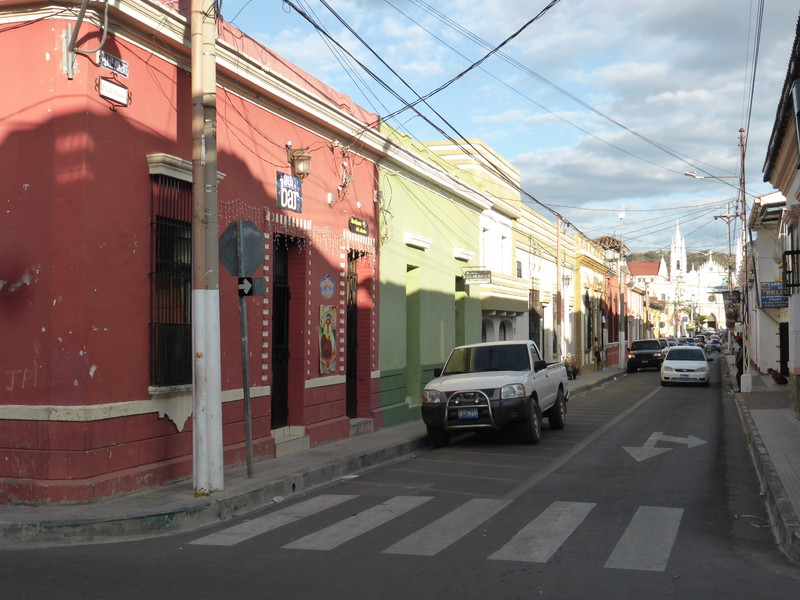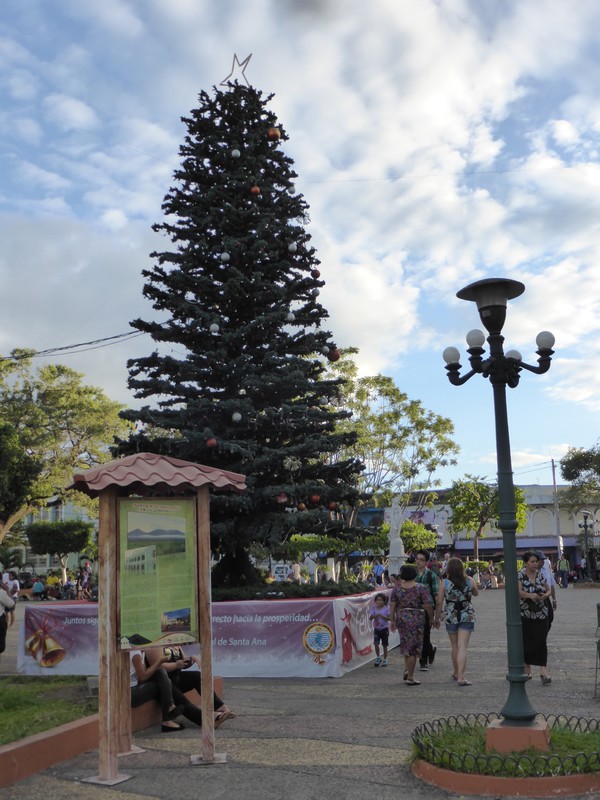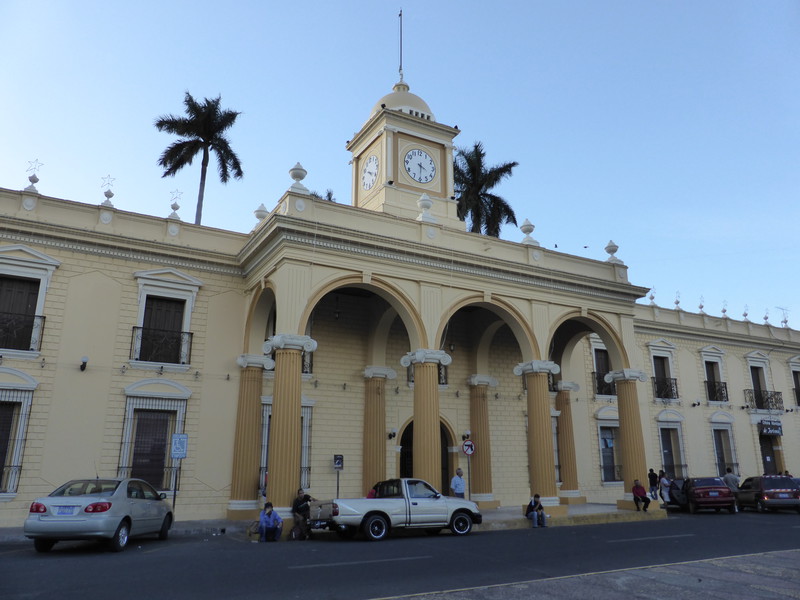
Santa Ana doesn't have a lot in terms of tourist attractions, but that isn't the point. Its main appeal for visitors is its handy location for visiting the nearby volcanoes and the Ruta de las Flores, but the city – the second largest in El Salvador with 180,000 inhabitants – does have a lot of charm.
We discovered this when wandering around the plazas and markets of the grid-based centre of the city. The biggest draw card is the lovely little main square with its bandstand, tall trees and impressive buildings, in particular the white neo-Gothic cathedral in the northeastern corner, and the ornate green-and-white Teatro de Santa Ana on the northern side of the square. The plaza is a hangout for the locals, particularly in the afternoon when Salvadorans traditionally break for coffee and cake, and their smiles makes it a pleasure to wander around. The pervading attitude is probably best summed up by the reaction of the police officer in the park when I tried to take a picture of the plaza's Christmas tree by which he was standing. Instead of grimacing at me and waggling a finger, which is the normal reaction of authority figures in gun-toting regimes the world over, he instead grinned at Peta when she pointed at the tree, and he happily backed away so he wouldn't get in shot. He was all smiles and waves as I clicked away; even the policemen are welcoming in El Salvador.

In the city's other square, a few blocks to the west of the main plaza, we were accosted by another smiling local, who introduced himself with a handshake and a cheery, 'Hello, how are you?' In stilted but very eager English, he introduced himself – though I won't mention his name, because I wouldn't want him to suffer any repercussions for what he went on to say – and he explained he was a Christian, and went on to talk about his country, expressing his love for visitors from abroad, his love for Jesus Christ, and his life as a student. He just wanted a chat, so we stood and talked for a good 15 minutes, of which a good ten minutes was spent trying to decipher each other's sign language; but he was charming and really wanted to try out his English, so it was easy to keep on talking. And then he started getting a bit more serious.

'But the Bad Boys, they run my country now,' he said. 'They do not care, they do not have faith in Jesus Christ.'
And with that his eyes welled up, and he started talking about how impossible it was to get a job, despite having graduated, and how the Salvadoran gangs were ruining the country. He kept comparing his country to the situation in Europe after the war, and we kept pointing out that time is a great healer, and Europe was a good example. He didn't sound convinced; the Bad Boys were clearly a big problem for his country, and we found it hard to reconcile his very real assessment of the future with the lovely, smiling people all around us.
After Dark

That night, though, it all became a bit more real. When darkness falls in Santa Ana, the city totally shuts down, and it's eerie. The streets go from bustling and friendly to utterly, utterly dead in the space of an hour, and by the time the sun has set, all the shops are shuttered up, the streets are deserted, and an eerie tension seems to settle on the city. The advice from locals and foreign governments alike is not to venture out after dark on foot, but to take taxis instead, because it's at night that the Bad Boys roam. I did pop out one night to buy some water from the petrol station a few blocks from the hostel, as I needed a couple of bottles for our planned volcano climb, and it was totally bizarre; as I strode purposely to the shop, I heard loud kissing sounds from the prostitutes standing in the shadows of the darkened doorways, got waved at in a less than friendly way by a couple of shady characters hanging out on the street corners, and had to step over two totally comatose bodies on the pavements (at least, I assume they were comatose rather than dead; it's hard to tell when you have no intention of stopping). It was only when I got back to the hostel with $1.20's worth of water that I realised I'd just wandered into the backstreets of an El Salvadoran city after dark with $100 in cash in my back pocket, which I'd completely forgotten to leave in the hostel. In terms of stupidity, that's quite high; I won't be doing that again.

Come dawn, though, the rest of the city wakes up with a chorus of loud chicken buses and distant cockerels, and the streets spring back into life. Market stalls magically unwind from the shuttered side streets and the city breathes easy after another night, and it's hard to remember the dark atmosphere of the night before. The Bad Boys, it seems, are nocturnal, so for the duration of our visit to El Salvador, we'll probably be staying in a lot after dark. Luckily, in Santa Anna at least, the Casa Verde proved to be a home from home, with an interesting selection of travellers, a lovely courtyard, cold beer, a nearby supermarket, and a very friendly manager who helped us arrange our excursions to the volcanoes and local sights. I just have to remember not to be lulled into a false sense of security again, as this is clearly a pretty serious part of the world.
A Night on the Town

Despite the city shutting down at night, we thought it would be nice to go out for an evening meal on the Saturday, and Carlos kindly recommended a restaurant, the Taberna de Capitan, and said he'd drive us there and back. The streets were completely dark and devoid of life, apart from a few people gathered round the few lit doors that we saw, and the restaurant was a lot further than we'd anticipated from the map, so it was a good job we had a lift. When we arrived at the restaurant, the guard on the door wandered over with his sub-machine gun casually but firmly in place, and Carlos told him to look after us and that we'd be asking the waiters to ring him later to pick us up again. The guard smiled at both of us and ushered us in with a flick of the muzzle, and we walked in the front door and into a totally different environment.

It really does all go on behind closed doors at night. The restaurant was just like a classy seafood joint in a safe American town, and all the clientele were smartly dressed and tucking into seafood and beer with gusto. We picked a nice quiet table in the centre of the three main sections, ordered some drinks and food, and settled in to enjoy the evening as more and more smartly dressed socialites arrived. Unfortunately, as we polished off our starters, a slick-looking man with a ponytail wandered over to the corner just opposite us, where I noticed two huge Peavey loudspeaker stacks that I hadn't spotted on the way in. He plugged in his laptop, pushed some buttons and twisted a few knobs, and the next thing you know all hell broke lost in the form of ear-twistingly loud Latin American music. Not only that, he started singing along, gently turning up the volume after each verse until it was too loud for us to hold a conversation, and he then turned on a set of disco lights that blinded everyone within shouting distance.
The other diners seemed quite happy with this – indeed, the tables in our section soon filled up with parties eager to sing along to the latest hits – but it was all a bit much for us as we'd only just finished climbing a volcano, so we retired to the bar, where they were playing their own music in competition to the singer, while the televisions dotted around the restaurant stubbornly continued to show the Brazil-France World Cup quarter final from 1986. It was all a bit of a shock after the eerie silence of the streets outside, so we paid up and Carlos came to pick us up and take us back to the comparative tranquillity of the hostel.
Perhaps El Salvador isn't going to be so quiet at night after all...